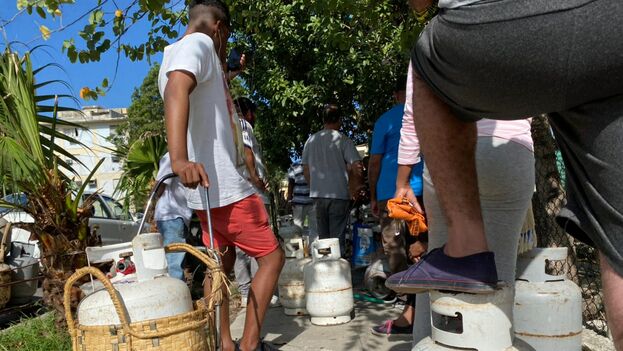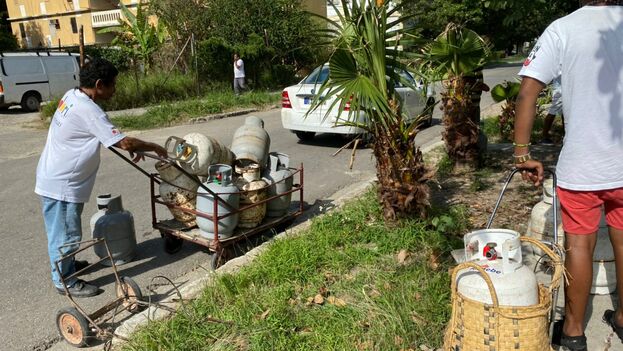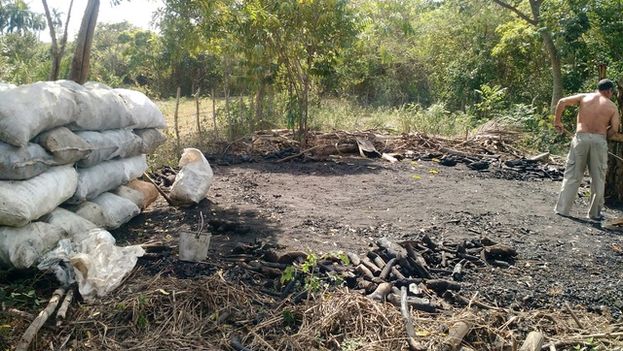
![]() 14ymedio, Luz Escobar, Havana, 18 January 2020 — After one in the afternoon last Thursday, Eloísa and Miguel were preparing lunch for their grandchildren who were about to return from school when they were moved by a noise they felt in their window. It was the liquefied gas truck. The roar of the canisters crashing into each other put the entire neighborhood on the run and in a few minutes the line was in place at the point of sale ay Estancia and Lombillo, in Havana’s Nuevo Vedado neighborhood.
14ymedio, Luz Escobar, Havana, 18 January 2020 — After one in the afternoon last Thursday, Eloísa and Miguel were preparing lunch for their grandchildren who were about to return from school when they were moved by a noise they felt in their window. It was the liquefied gas truck. The roar of the canisters crashing into each other put the entire neighborhood on the run and in a few minutes the line was in place at the point of sale ay Estancia and Lombillo, in Havana’s Nuevo Vedado neighborhood.
Both grandparents went down the stairs of the building without thinking twice and in a few minutes were already, rationbook in hand, asking who was last in line*. “I turned off the kitchen and ran down because after listening to what they said on television one cannot afford to miss a delivery. There are four of us. Before the gas came every 21 days and it was enough for us, but now it comes every 32 days and we have to make do, there isn’t any more,” says Eloísa.
Now, “to make it last longer,” there are “small luxuries” that can no longer be enjoyed, she explains. “No chicken roasted in the oven, or baking my bread, which I like so much. The gas will be only be enough to cook the basics, the day to day.” Eloísa was just over 30 years old when the Special Period came into her life and she says she “stresses” at any event that reminds her of those times in which she raised her children in the midst of “so many needs.”
Also in line is Justo. In a wheeled cart he brings 12 canisters, as the messenger for many families who work all day and they pay him to be aware of the arrival of rationed products sold through the rationbooks. “I’ve been coming for two days, yesterday I spent the whole afternoon waiting for the truck but it didn’t arrive. I left empty-handed,” he says.
“My clients are on tenterhooks since they reported on television about the shortage of gas and the new measures for its sale. They all insisted I hurry and I’ve been here since before the truck arrived, ready to buy,” explains the man, who is number one in a line of about 14 people.
The state-owned company Union Cuba-Petroleum (Cupet) and the Ministry of Energy and Mines announced that the inventories currently on the Island “do not cover consumption, so there have been effects” in the sale of liquefied gas to the population. According to its website, this company is responsible for “ensuring the supply of fuels and lubricants” and “complying with the importation of fuel at the levels agreed to in the supply contracts.”
Since this product began to be sold off the ration book in 2013, in parallel to the “rationed” system, it has become the fastest growing form of energy in homes in Cuba. Today it represents approximately 60% of total fuel consumption, according to data from the National Bureau of Statistics and Information.
At the end of the year, not only was the rationed delivery of liquefied gas regulated but also the delivery of new contracts was halted due to an “increase in capacity.”
Four months ago, Raúl García Barreiro, head of Energy and Mines explained that, in the context of the “new energy situation,” although in August and September there were problems with the provision of liquefied gas, the full supply for the population was “guaranteed for the whole year.”
However, just at the beginning of 2020 there was an announcement of the need to take “measures to reduce consumption” of liquefied gasuntil there is “a stable supply” and Cubans have been called on to adopt “saving” measures and “efficient use” of this energy source.

After Monday’s announcement, many have lost hope. This is the case of Abel Cartaya, in Matanzas, who asked the Minister of Energy on Twitter for the reasons why he has not been allowed get a contract for liquefied gas.
Cartaya tells this newspaper that a year ago he was able to assume ownership of his partially complete house, although it is still “under construction” and that from the first moment he went with his ration book to get a contract for gas.
“In the offices where the procedures are carried out, they informed me that the contracts were halted until further notice. Last year I went on three occasions and they answered the same thing. Last week I spoke with an employee of the gas sales point below my house, and I asked him the same question and the answer was similar to the others. They won’t give me any date,” he tells at 14ymedio.
At the liquefied gas sales point that Cartaya visited, employees are “directed” to organize a sale “every 60 days,” one of the workers informed him on Tuesday.
“Right now, the contracts for unrationed sales are halted, since the country does not have the necessary means for it, whether it comes by hose, regulator, cylinder or canister, there is currently a shortage of the product due to the blockade [American embargo]. The containers the country currently has are intended to guarantee service to customers who already have a contract,” explained Cupet.
In Santiago de Cuba, in the neighborhoods of Altamira, Ciudamar, Antonio Maceo and Versailles — although “the comment is on the street so it came out on the news” — they still have supplies and nobody is without gas, a resident of the area told this newspaper.
“The point is that all this is reminding people of what happened in the Special Period when there was nothing to cook with. Some have burners, electric pots or rice cookers, but there are those who do not have that and it is logical to panic. Nobody wants to have to cook with coal or firewood again, it is inhuman,” he added.
In other locations near the capital, such as Candelaria or San Cristóbal, “nobody has a contract,” said a Artemis resident by telephone. “Only the elderly who have some health problems or the sick. Right now we are looking for how to fill the spare we have before the desperation of the people grows and the product is gone, because everyone already saw what was said in the news,” added the woman, who said that in her house they alternate between the electric burner and the little canister to make it last longer.
“What I see that is happening is a ’situation’ with energy, more than anything, but I do not understand how you can save on liquefied gas. If you have to cook, you have to cook, the water must be boiled so as not to get sick**, in short, we will return to the firewood… well, if you have a patio [i.e. can cook outside]. And those who don’t will have to look for coal which is not easy to acquire,” she laments.
Ivón and Nadia Linares, two sisters residing in the municipality of Güira de Melena, are preparing to return to the years when most of the food in the house was cooked with firewood. Based in an agricultural area but with little wood vegetation in the province of Artemis, the two women have to walk long distances to collect fragments of branches and trunks.

“Those who are going to win are those who sell coal and they have already raised the price of the bag, now it is very difficult for you to find one below 50 pesos,” laments Ivón, who says she has become accustomed to cooking with the cylinder of liquified gas. “I kept it for cooking beans, rice, heating the children’s milk and left the wood to boil the towels, heat water for the bathroom or cook the root vegetables.”
Nadia does not believe that electricity is a substitute for liquefied gas. “The electric bill goes up a lot if you cook with the burner and also here all the equipment we have has been breaking down little by little,” says the woman in reference to a small kitchen, a very rustic water heater and a water heating device sold to the residents of their community during the years of the so-called Energy Revolution promoted by Fidel Castro.
“In this neighborhood almost no one has a working electric burner,” says the woman. “Here we are cooking as our grandmothers cooked, lighting the wood, blowing a lot of air into it to keep it going and with all the soot-filled cauldrons, it’s the same as a hundred years ago.”
Translator’s notes:
*In Cuba people establish their places in line relative to those just ahead of them and just behind them, and then are able to move around, and even leave and come back (if the line is very long), and so on.
**Cubans must boil their tap water to make it safe to drink.
________________
COLLABORATE WITH OUR WORK: The 14ymedio team is committed to practicing serious journalism that reflects Cuba’s reality in all its depth. Thank you for joining us on this long journey. We invite you to continue supporting us by becoming a member of 14ymedio now. Together we can continue transforming journalism in Cuba.
